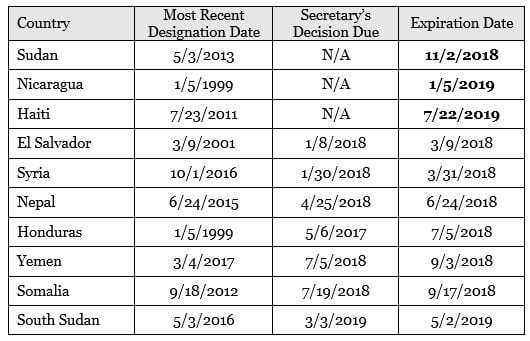Fact Sheet: Temporary Protected Status
What is Temporary Protected Status?
Temporary Protected Status, or TPS, is a designation by the Secretary of Homeland Security that a country receives if conditions in the country are deemed dangerous enough that an individual from that country, currently residing in the United States, would not be able to return safely, or if the country is unable to handle the return of its nationals from the United States. This can include situations such as national disasters, disease outbreaks, or civil unrest. Typically, the DHS Secretary will consult with the governments of the TPS countries, the State Department, and DHS immigration components in determining whether to grant, extend, or terminate TPS designation for any country. TPS designations can last for six, 12, or 18 months and must be re-evaluated to determine whether they should be extended or terminated by the Secretary within six months of the expiration of the current designation.
What immigration laws apply to TPS designees?
Foreign nationals granted status under TPS designation are not given permanent legal status, but are protected from removal from the United States. They can also obtain employment and travel authorization. If the TPS designation for their country is terminated, they revert to whatever immigration status (including undocumented status) they had before applying for TPS, if it is still available to them. For example, someone who was a nonimmigrant student and applied for TPS might return to student status after the termination of TPS, if they are still a student in school. If they were no longer a student, and did not have other lawful status they could apply for, then they would have to leave the country or become undocumented and risk deportation.
What countries’ nationals currently qualify for TPS?
Currently, the following countries are designated for TPS: El Salvador, Haiti, Honduras, Nepal, Nicaragua, Somalia, Sudan, South Sudan, Syria, and Yemen. There is an estimated total of 325,000 people from those countries qualified for TPS currently living in the United States. That includes roughly 195,000 Salvadorans, 50,000 Haitians, 57,000 Hondurans, 8,950 Nepalese, 5,300 Nicaraguans, 250 Somalians, 1,040 Sudanese, 70 South Sudanese, 5,800 Syrians, and 1,000 Yemeni.
What changes has the Trump administration made to TPS?
On November 6, 2017, then-Acting Secretary of DHS Elaine Duke announced that Nicaragua’s TPS designation was to be terminated as of January 2019, while a decision on extension of TPS designation for Honduras is still under review, with a postponement on a decision until July 5, 2018. Prior to this most recent memo, the administration announced an end to TPS designation for Sudan, with an expiration date in November 2018. TPS designation for Haiti was revoked on November 20, 2017 with an 18-month delay and resulting in termination of status for TPS Haitians on July 22, 2019. DHS must decide on whether to extend or revoke TPS designation for El Salvador by January 8, 2018. Other dates for the remaining countries are shown in the chart below.

This fact sheet was updated on January 4, 2017.
Share
Read Next
Support Research Like This
With your support, BPC can continue to fund important research like this by combining the best ideas from both parties to promote health, security, and opportunity for all Americans.
Give NowRelated Articles
Join Our Mailing List
BPC drives principled and politically viable policy solutions through the power of rigorous analysis, painstaking negotiation, and aggressive advocacy.